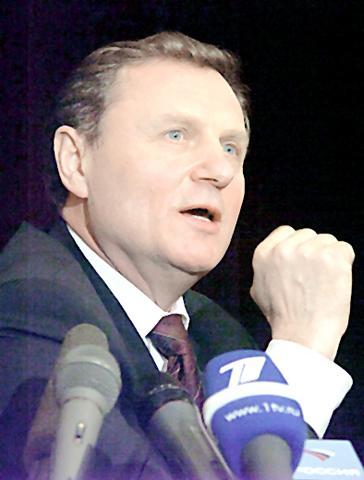Ivan Rybkin, a critic of Vladimir Putin and an ally of one of the Russian president's fiercest foes, dropped out of the presidential race Friday, nine days before the vote.
"I am withdrawing my candidacy, I will not participate in this farce," Rybkin said at a news conference just a little over a week ahead of the March 14 election, which Putin is widely expected to win in a landslide. Rybkin added that "working as an opposition candidate is very difficult."
He spoke after returning from a three-week trip abroad, having left Russia citing security concerns following a murky incident in which he went missing for days and claimed he was the victim of foul play.

PHOTO: EPA
On Friday, Rybkin again suggested he was the victim of some kind of politically motivated persecution in connection with his candidacy. "I expected pressure, but I did not expect such lawlessness," he said.
Rybkin was running in the election with the backing of self-exiled tycoon Boris Berezovsky, a bitter enemy of Putin. His association with Berezovsky, one of the so-called oligarchs who made quick fortunes in post-Soviet Russia, and his lobbying for peace talks with Chechen rebels have made Rybkin an unpopular figure in Russian politics. Polls have suggested he would receive less than 1 percent of the total vote.
Rybkin's announcement came after a court rejected his complaint against the Central Election Commission over its decision to prohibit him from taking part in televised campaign debates via video link from London.
Rybkin had initially said that he would remain abroad until the election. He traveled to Britain, where Berezovsky lives, after disappearing for five days last month and then turning up in Ukraine. At first he said he had simply gone to Ukraine to take a break, but he then claimed he was lured there, drugged and made the subject of a compromising video.
Rybkin said he would not quit politics, pledging to speak out as if he were a candidate. In an apparent effort to display independence, he said he had not told Berezovsky of his decision before making the announcement.
Rybkin, a former parliament speaker and head of ex-President Boris Yeltsin's Security Council, was one of six candidates challenging Putin, but polls indicate a sweeping victory for the incumbent president.
The vote comes three months after the main pro-Putin party United Russia swept parliamentary elections following a campaign international observers said was unfair because of the government's use of the state-run media and other levers of power to influence voters.
Central Election Commission chairman Alexander Veshnyakov on Friday dismissed concerns from liberal candidates and other Putin critics that the president has benefited from lopsided media coverage. "Like it or not, any incumbent has certain advantages compared to other candidates," he told a news conference.
Veshnyakov said he expects turnout will reach at least 60 percent, clearing the 50 percent hurdle needed to make the election valid.

‘UNUSUAL EVENT’: The Australian defense minister said that the Chinese navy task group was entitled to be where it was, but Australia would be watching it closely The Australian and New Zealand militaries were monitoring three Chinese warships moving unusually far south along Australia’s east coast on an unknown mission, officials said yesterday. The Australian government a week ago said that the warships had traveled through Southeast Asia and the Coral Sea, and were approaching northeast Australia. Australian Minister for Defence Richard Marles yesterday said that the Chinese ships — the Hengyang naval frigate, the Zunyi cruiser and the Weishanhu replenishment vessel — were “off the east coast of Australia.” Defense officials did not respond to a request for comment on a Financial Times report that the task group from

Asian perspectives of the US have shifted from a country once perceived as a force of “moral legitimacy” to something akin to “a landlord seeking rent,” Singaporean Minister for Defence Ng Eng Hen (黃永宏) said on the sidelines of an international security meeting. Ng said in a round-table discussion at the Munich Security Conference in Germany that assumptions undertaken in the years after the end of World War II have fundamentally changed. One example is that from the time of former US president John F. Kennedy’s inaugural address more than 60 years ago, the image of the US was of a country

BLIND COST CUTTING: A DOGE push to lay off 2,000 energy department workers resulted in hundreds of staff at a nuclear security agency being fired — then ‘unfired’ US President Donald Trump’s administration has halted the firings of hundreds of federal employees who were tasked with working on the nation’s nuclear weapons programs, in an about-face that has left workers confused and experts cautioning that the Department of Government Efficiency’s (DOGE’s) blind cost cutting would put communities at risk. Three US officials who spoke to The Associated Press said up to 350 employees at the National Nuclear Security Administration (NNSA) were abruptly laid off late on Thursday, with some losing access to e-mail before they’d learned they were fired, only to try to enter their offices on Friday morning

CONFIDENT ON DEAL: ‘Ukraine wants a seat at the table, but wouldn’t the people of Ukraine have a say? It’s been a long time since an election, the US president said US President Donald Trump on Tuesday criticized Ukrainian President Volodymyr Zelenskiy and added that he was more confident of a deal to end the war after US-Russia talks. Trump increased pressure on Zelenskiy to hold elections and chided him for complaining about being frozen out of talks in Saudi Arabia. The US president also suggested that he could meet Russian President Vladimir Putin before the end of the month as Washington overhauls its stance toward Russia. “I’m very disappointed, I hear that they’re upset about not having a seat,” Trump told reporters at his Mar-a-Lago resort in Florida when asked about the Ukrainian